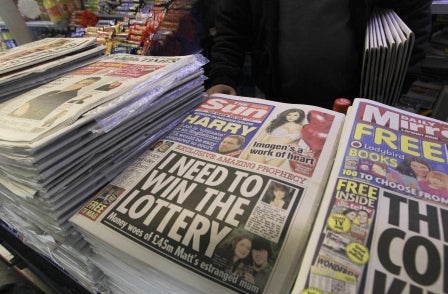
A new opinion poll has suggested widespread public support for a consultation before a Royal Charter to regulate the press comes into force.
The Survation online poll of 1,001 UK adults asked whether the proposed Royal Charter on press regulation should be subject to consultation “so the public can have their say”. Some 76.1 per cent said it should, but only 12 per cent agreed with the statement “there is no need for public consultation if the Royal Charter has been approved by politicians”.
The three main political parties agreed in March to a plan for a Royal Charter-backed system of press regulation with campaign group Hacked Off which is set to be signed by the Queen at the next meeting of the Privy Council on 15 May. The Newspaper Society, PPA and most national newspaper publishers have put forward a rival Charter which allows publishers to retain control of the regulator and which does away with an element of statutory underpinning.
The publisher-funded Free Speech Network, formed last year to argue against state regulation of the press, commissioned the Survation poll.
The Newspaper Society argues that the proposed press regulation Royal Charter should be put out to proper public consultation before being given Royal Assent.
The survey also asked respondents whether the new press regulation system should be set up in a way that gives politicians the final say if and when changes need to be made. Some 15.8 per agreed with this but 66.5 per cent said it should be set up in a way that does not give politicians the final say.
Under the cross-party Royal Charter a two thirds majority of both houses of Parliament is needed to change the Charter. Under the industry plan, the Charter can be changed with the unanimous agreement of the Recognition Panel, the regulator's board and the publishers.
A further 53.7 per cent of respondents to the survey said “a new tough system of press regulation should be set in place as soon as possible” and 32 per cent agreed that the new system should not be set in place “until all three political parties and any interest groups have agreed to it".
Some 83.5 per cent of respondents said the newspaper and magazine industry should fund the new regulator, while 8.6 per cent said that the taxpayer should do so.
The poll also asked respondents: “Thinking about any local newspapers published in your home town or county, do you think they are on balance a positive or a negative force in your local community?” The majority, 53.3 per cent, said they were positive, 8.3 per cent said they were negative and 32.7 per cent said they were neutral.
In a Q&A on the Royal Charter put out by the Newspaper Society, the publishers’ group said: “We have been trying for weeks to get the Culture Department to agree to a consultation process on their Royal Charter, but they have refused, saying it is a state-sponsored Charter so there is no need for consultation. Our Royal Charter, which is a genuine voluntary Charter, will go through the normal Royal Charter consultation process supervised by the Privy Council Office. Anyone who wants to suggest amendments will be able to do so.”
Hacked Off has dismissed this saying: “This is wishful thinking. The Privy Council Office has not agreed to hold any consultation on behalf of the newspaper industry (nor would it do so – that’s not its job). By contrast, the Leveson Royal Charter is the outcome of a 15 month-long public inquiry and three months of cross-party negotiations which the press took part in. Opinion polls show that the majority of the public will not accept a system run for the benefit of the press.”
Email pged@pressgazette.co.uk to point out mistakes, provide story tips or send in a letter for publication on our "Letters Page" blog
